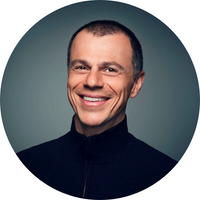
In a 12.3.2019 Forbes Article, you wrote about Gen Zers (born between 1995 – 2010), you noted that 85% of them get their information from social media. What do you see as the pros and cons for this generation regarding their reliance on social media for information? What about companies seeking to sell to them – what should they most keep in mind?
We found that Gen Zers are driven by their ideals and values, and they use social media to constantly assess the relevance of their surroundings and choices (including brands) with these ideals and values. To them, building trust requires a two-way conversation, and they're looking for opportunities to have conversations as they make decisions. Gen Zers are amazing, and I have so much hope for humanity specifically because of this generation.
While they rely on social media for information, they are far less likely to delve deep into topics. Our research showed that they consume all the headlines, but don’t read far beyond the headlines to deepen or challenge their assumptions and their understanding. This has the danger of driving them to make less informed decisions and can contribute to fast judgment and ‘cancel culture’.
As brands who seek to sell to them consider this generation’s content consumption habits, it’s important to provide a safe space to allow this community to express themselves, to provide information in new, bite-sized formats and to communicate authentically and with transparency. Remember, they’re looking for a conversation, rather than being marketed to. ‘Corporate speak’ was never really that appealing to anyone, but this generation doesn’t tolerate it at all.
What are some of the most pressing challenges confronting the life sciences and healthcare industries?
At the highest level, I believe that science suffers from a usability problem. People don’t know how to interact with and ‘use’ science in their daily lives. And virtually every societal problem that we can think of, from the climate crisis to healthcare affordability, to education, to people’s wellness choices, all have a common root: the science is there, but people don’t know how to access it, understand it, make meaningful decisions, and take positive action based on it.
It's not because people aren’t smart enough. It’s because we haven’t applied the same principles of usability that we apply to other facets of society to the most valuable corpus of knowledge we have, which is science.
It’s my belief that we should stop telling people about the science, and start inviting them to experience it. By understanding and applying principles of how people learn and how they make decisions, we can make profound change, not only for the life science and healthcare industries, but virtually every industry and enterprise globally.
As an example, I would like to re-invent the scientific paper. At the most basic level, this is a fundamental unit of scientific currency that authors deposit into the bank of knowledge. The fundamental structure and usability of this unit of currency, however, has seen little to no innovation or improvement in usability for well over 100 years, despite all of the tools that are available to humanity today. It’s time to rethink the usability of science.
In a TEDx Cambridge talk, you referenced ‘science moving truth forward.’ How would you assess the performance of the global scientific community over the last 2.5 years in terms of communicating with the public regarding Covid?
In December 2021, as Dr. Francis Collins was retiring from his role as the director of the NIH, he was asked in an interview what he wished the NIH could have done differently during the pandemic. He lamented “Maybe we underinvested in research on human behavior. I never imagined a year ago ... that we would still have 60 million people not get vaccinated.”
The pandemic has provided a tremendous lesson that science moving the truth forward requires so much more than providing data or convincing people to take action based on facts and figures. We need to acknowledge that human beings are beautifully complex, and we can understand decision-making patterns to architect choices that invite them to experience science for themselves.
With every project we take on at LINUS, whether it’s launching a new product for scientists, a new tool or therapeutic for clinicians to use, or a health technology for patients and consumers, it is our mission to close this gap between science and humans by applying better usability in any arena where technical decisions are made.
What have you learned about the decision-making patterns of scientists that you can share to help them be more persuasive with workplace colleagues?
Well, I have written two books on the topic, but the most fundamental thing that I have learned is that you need to first gain emotional acceptance before intellectual acceptance. And the way to do this is by starting from a perspective of empathy, then using storytelling as a form of communication where the audience you’re trying to persuade see themselves as the hero of that story.
Everyone has a film playing in their minds, in which they are the main character and the hero. Tap into that mental film, and you’ll have a far better reception than if you were to provide a lock-tight logical argument that wrestles your audience into intellectual submission. That argumentative approach usually comes across as combative instead of empathetic, and it rarely produces the desired result.
When did you decide a laboratory career wasn’t what you most wanted?
I studied chemistry in the early 1990s when the internet was beginning to become accessible, but virtually all scientific communications were limited to analog formats such as physical books and articles. I’m a visual learner and found myself drawn to bringing scientific concepts to life using new digital tools such as 3D animation and multimedia.
After graduation, I became a staff researcher at the Biochemistry department of Oregon State University. I would conduct research by day and develop scientific communications tools at night. I found that I could more easily express my creativity in developing new ways to access science than the creativity it takes to make novel scientific discoveries at the lab bench.
Did you make a proactive decision to pursue a career outside the lab, or did an opportunity present itself?
It was a gradual decision. I was still enjoying scientific research, but I was more passionate about the intersection of design, technology, and communications in the sciences and their impact on decisions. A professor at Oregon State University saw my 3D animation work and connected me with a publisher of scientific textbooks, with the recommendation that they hire me to develop multimedia supplements for their textbooks. At the time, however, publishers were afraid of digital media, fearing piracy and cannibalization of their textbook sales, so they didn’t hire me. But I felt such a strong sense of conviction about my ideas that I decided to call scientific instrumentation manufacturers to hire me to describe their technologies. I found a receptive community amongst the marketing departments of companies who recognized the tremendous potential of digital communications in connecting with their audience, and I kept winning contracts to produce content for them.
To develop better communications for clients, I started to observe how the scientists around me consumed information, how they formed their opinions on what they believed and what they refuted, and I started to see patterns in how scientists make decisions. This was pivotal for me because I noticed several blind spots in the scientific method and misconceptions about the scientific decision-making journey. This topic became my obsession and has shaped my career since then.
What were your priorities as you assessed the various non-traditional career opportunities available to you?
Being immigrants, my family put strong emphasis on steering me toward traditional vocations that were guaranteed to place me on an upwardly mobile financial path (e.g. ‘you should become a doctor’). My interests at the nexus of decision-making, science and design thinking utterly bewildered my family. At that time there weren’t any jobs I could apply for that enabled me to truly pursue my passion and the opportunity to make a positive impact on how science is communicated and leveraged felt so large that I didn’t feel I could genuinely continue pursuing traditional scientific career paths. I decided that my main priority was to follow my passion and decided to start a company, even if it cost me a prestigious path of becoming a clinician or a scientist.
Was this a rational, logical decision, or did your gut just tell you this was the right answer?
It was definitely not a rational or logical decision. Leaving the science research community was difficult. When I told the chairman of my department of my choice and business idea, he put his arm around me and professed a eulogy of my scientific career, saying in past tense: ‘you were so bright; you would have made a great scientist’.
Starting a company also wasn’t a logical choice. Since I had no resources or any jobs to apply for which allowed me to pursue my unique interests, I didn’t feel I had a choice but to start my own company.
It’s easy to romanticize entrepreneurship; the mainstream media’s idolization of successful entrepreneurs creates a false sense of superiority that entrepreneurs are somehow smarter or more powerful. I view entrepreneurship as a trait, equivalent to being left-handed. It’s no better or worse. In my case, entrepreneurship wasn’t something that I sought out, but in retrospect, I’m grateful that I found this drive early in my career and was so entranced by my idea that I didn’t think too much about all the ways in which I could fail, because otherwise I may have succumbed to a miserable life of pretending to be right-handed. (I am, in point of fact, left-handed).
In what ways, either directly or indirectly, does your non-traditional career make use of your previous scientific training?
Like the most passionate scientists I know, my career is shaped by a central question: “how do technical decisions get made, and how are those decisions influenced by behavioral nudges, experiences and information?” I have taken a scientific approach to trying to make new discoveries that further our understanding around this topic. Whenever my team and I have an opportunity, we publish our findings around this topic, including in two books: Persuading Scientists and Catalytic Experiences. Finally, I never feel that I’m done discovering or learning: the pursuit of finding answers to questions just leads us to new questions. And I’m so grateful that I have created a business and surrounded myself with a team that inspires and enables me to follow this path.
Looking back, how would you assess the performance of your university in making you aware of non-traditional career opportunities? What might it do differently?
I never became aware of any non-traditional career opportunities in science through my university or academic colleagues. In my experience, science has created narrow prescriptive career paths for students. In my research, I have heard that students are sometimes chastised for attending career fairs, for expressing interest in moving into industry, or for pursuing alternative careers.
I believe that universities should recognize that there are multiple types of creativity and encourage students to identify their personal type of creativity where they feel most inspired and engaged, and then to actively find careers where those specific types of creativity are valued and nurtured.
Reflecting on my own path, I didn’t have the kind of creativity to contribute to novel scientific discoveries, but I faced tremendous resistance and friction from the scientific community to find and express my own kind of creativity.
If your non-traditional career choice would have been known to you as a junior in high school, would it have impacted your choice of where to attend college? Pursue an advanced degree?
No. While in retrospect I could have navigated some things differently, my career was ultimately shaped by the specific experiences I was lucky enough to have and the luxury to reflect on them and ask questions that led me through my journey. I believe that I would be in a different place had any one of my experiences not been in my journey. I feel so incredibly grateful to have the opportunity to do what I do that I wouldn’t change anything.
What is the most gratifying aspect of your career?
I believe in sharing what I have learned with the world, and while I enjoy writing books and articles, I truly get energized when I’m asked to present to an audience. It’s during those moments of giving talks and engaging with audiences that I learn so much, and those interactions are priceless!
If you could select a total of three scientists/business leaders – deceased or alive – to support you on the project of your choice, what project would you pick, and who would you put on the team?
To be honest, I already feel so lucky to get to work with the incredible team at LINUS every day. Not only is each single team member incredibly smart, passionate, and creative, as a team we seem to take things to a whole new level in the creative thinking and ideas we develop for our clients. They inspire me and push me to be a better person every day.
As for the project of my choice, I would like to address a serious global epidemic that affects millions of people, is a known comorbidity in many health conditions, and drives up healthcare costs. And it can be largely addressed using behavioral psychology:
Obesity.
In 2019, the US spent $3.77 trillion in healthcare, and conservatively, $850 billion per year is attributed to the cost of care and productivity loss as a result of obesity, diabetes and heart disease alone (the latter two conditions have obesity as a comorbidity).
Americans are, on average gaining weight as time goes by, which signals that people are more likely to suffer from health complications and the cost of healthcare will continue to rise.
I believe we can make significant positive impact in people’s health by using behavioral psychology. But it’s not just focusing on encouraging people to diet and exercise. A systemic approach, creating incentives for policymakers, industries, the healthcare system and individuals is what’s required to make meaningful change.
I would love to work with America’s health leaders, the most brilliant minds in behavioral economics, psychology and sociology to create this program in an actionable way.
Imagine a program that can save America 20% of its healthcare costs and improve quality of life for millions of people! We have much of the knowledge, technology and tools to affect this change, and it creates so much mutual benefit for everyone!

Hamid Ghanadan is the founder of Linus, the strategic marketing agency that has redefined marketing for science and medical industries. A chemist by training, Hamid has dedicated his career by studying the interplay between logic and emotion in how people understand technical information, and applying storytelling and user-experience theories to shift understanding. He is the author of two books: Persuading Scientists and Catalytic Experiences, and is a frequent speaker at industry events, corporate events, as well as the global stage at TEDx. He lives in Boulder, Colorado.
The opinions expressed in this article are the author's own and do not necessarily reflect the view of their employer or the American Chemical Society.





